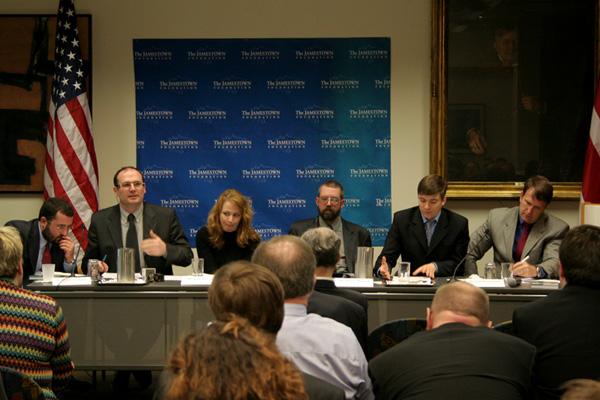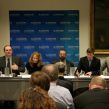
RUSSIAN REACTION TO JAMESTOWN CONFERENCE REVEALS KREMLIN FEAR OF FREE SPEECH ABOUT THE SITUATION IN THE NORTH CAUCASUS
Publication: Eurasia Daily Monitor Volume: 3 Issue: 77
By:

On April 18 the Russian Ministry of Foreign Affairs presented William Burns, the U.S. Ambassador in Moscow, a note of protest in connection with a Jamestown Foundation-sponsored seminar that took place in Washington on Friday, April 14, “Sadullaev’s Caucasian Front: Prospects for the Next Nalchik.”
As the Foreign Ministry noted, “in the course of the seminar the participants called for new terror acts on the territory of Russia.” The U.S. Ambassador was reminded, “The conduct of such activities on the territory of the U.S. is incompatible with the international obligations of the United States in the sphere of struggle against terrorism,” in particular with UN Security Council Resolution 1624, “Threats to International Peace and Security,” which the United States played a major role in developing. “The fact that Washington DC tolerates Chechen gunmen and separatists is incompatible with the spirit of partnership that would be necessary for anti-terrorist coordination of the two countries and it is also harmful for bilateral relations,” according to the note (gazeta.ru, April 18).
The public discussion organized by Jamestown took place at the conference facilities of the Carnegie Endowment for International Peace in Washington, DC. Five people made presentations, including Glen E. Howard, president of the Jamestown Foundation; Ivan Sventsistski, an independent Russian journalist and coordinator of the Yalta Initiative for Peace in Chechnya; Dr. Andrew McGregor, director of Aberfoyle International Security in Toronto; Kelly McEvers, an American journalist who was arrested in Dagestan and deported from Russia at the beginning of April (see Chechnya Weekly, April 6); and Mairbek Vatchagaev, a Chechen historian who now lives in France and was previously a spokesman for Aslan Maskhadov, the Chechen rebel leader killed last year. All the participants spoke about the deteriorating situation in the North Caucasus, the rising frustration among the local population, and the possibility of a rebel attack in any part of that region.
Two officials from the Russian Embassy to the United States attended the event as observers. They were accompanied by journalists from the Kremlin-controlled ORT television network. ORT broadcast a story about the event on the popular 9 pm news program that night. The panelists were surprised to learn from the ORT story that they had planned new terrorist acts in Russia during their discussion in Washington.
“The statements that are made in the USA imply that new, large-scale acts of terrorism in Russia are necessary,” according to the ORT headline. “As a matter of fact, the presented subject of the event is ‘Perspectives of the New Nalchik.’ These perspectives were treated with sympathy” (ORT, April 14).
The note of protest from the Russian Foreign Ministry likely had been prepared in advance so that Russian authorities were ready to condemn the discussion irrespective of its content. The ORT report about the conference was needed to provide grounds for a protest to the American ambassador. ORT and the Russian authorities likely had coordinated their actions.
Clearly, the Kremlin was enraged just by the title of the discussion: “Sadullaev’s Caucasian Front.” Unlike in the United States, where the government encourages public research on terrorism issues and open analysis of al-Qaeda statements and publications on websites belonging to Islamic radicals, in Russia such topics are the exclusive prerogative of the authorities.
The Kremlin is not interested in providing either Russian society or the international community with detailed information about the Caucasian insurgency. Instead, officials in Russia use vague terms like “international terrorism” or “dark forces” to describe the source of instability in the south of the country. Sometimes some “unknown Arabs” are mentioned, but never actual insurgency leaders such as Abdul-Khalim Sadullaev. Nor does official Moscow recognize the existence of the Caucasian front, preferring to speak about “the criminal underground in the North Caucasus.”
The Russian authorities do not want to focus on Sadullaev, as his presence proves that the insurgency across the North Caucasus is directed from Chechnya by Chechen separatists, not by terrorists from Saudi Arabia or Afghanistan, as official propaganda claims. The authorities were even angrier about the fact that Vachagaev called Sadullaev the “Chechen president,” trying to present the rebel leader as a legitimate figure in the eyes of the Americans. Since Abdul-Khalim Sadullaev succeeded Maskhadov after the latter’s death last year, the Kremlin has used a number of devices to hide his name from the West, fearing that one day Western governments will start to persuade Moscow to initiate a dialogue with him. Previously they had called on Russia to negotiate with Maskhadov.
Russian authorities are also afraid of any accurate, thorough analyses of the situation in the North Caucasus. As it increasingly loses control over the region, Moscow has tried to make it off-limits to foreigners by deporting journalists and humanitarian-aid workers. Public discussions like the Jamestown forum on April 14 are considered as threatening to the Kremlin as independent, inquisitive journalists who try to enter the volatile region.
There is one more reason for the Russian authorities’ pained reaction to the Jamestown event. The Kremlin is watching closely the emerging dispute between two influential groups in the U.S. government. One, headed by Secretary of State Condoleezza Rice, stands for a pragmatic approach in U.S. policy towards Russia. The other group, led by Vice-President Dick Cheney, believes that Washington should be tougher in criticizing the policies of Russian President Vladimir Putin. It is no accident that the ORT report specifically tried to link Cheney with the Jamestown Foundation (ORT, April 14).
Many high-ranking Russian officials subscribe to a variety of conspiracy theories, and Putin’s entourage suspects that “anti-Russian forces” headed by Cheney are behind the Jamestown conference on the North Caucasus. The Russian leadership, which has established a “managed democracy” under which nothing can be done without permission from the authorities, simply cannot believe that a public discussion on a burning political issue could be solely the initiative of an independent, non-partisan organization.




